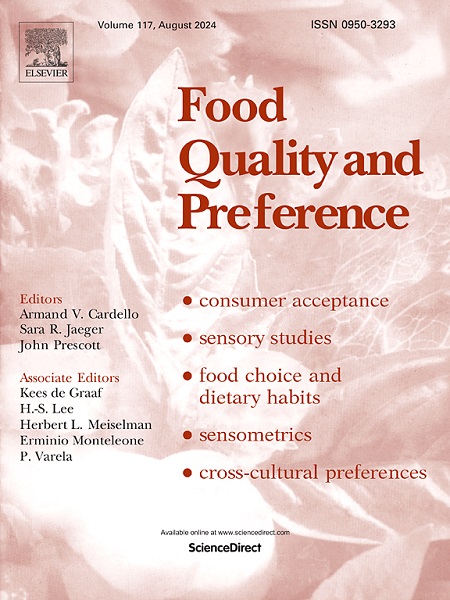The meat paradox and health-related aspects: A cluster analysis among red meat consumers
IF 4.9
1区 农林科学
Q1 FOOD SCIENCE & TECHNOLOGY
引用次数: 0
Abstract
Many consumers in Western countries enjoy eating meat as they consider it a key component in their diets, despite increasing awareness of the negative effects of meat overconsumption. The inner conflict that arises from the discrepancy between consumers' attitudes and actual behaviour can be named the “meat paradox.” Thus, meat eaters adopt rationalization as a coping strategy to solve this discrepancy by means of four meat-eating justifications, known as the 4Ns: eating meat is natural, normal, necessary, and nice. However, how these meat-eating justifications vary among consumers and to what extent health-related aspects influence rationalization is unclear. This is the first study that identified specific red meat consumer segments according to the 4Ns, shedding light on the influence of health-related aspects. To achieve this, a two-step cluster analysis was performed on a stratified, representative sample of 1179 Italian red meat consumers. As a result, three red meat consumer segments (flexitarians, potential flexitarians, and meat lovers) were identified according to their meat-eating justifications. In addition, they were characterized by different health-related aspects as well as consumption habits, social norms, and sociodemographic characteristics. Our findings provide theoretical implications and practical knowledge to policymakers and non-profit organizations devising interventions to reduce excessive meat consumption and shift toward more sustainable diets.
肉类悖论与健康相关方面:红肉消费者的聚类分析
西方国家的许多消费者喜欢吃肉,因为他们认为这是他们饮食中的一个关键组成部分,尽管人们越来越意识到肉类过度消费的负面影响。消费者的态度与实际行为之间的矛盾所产生的内心冲突可以被称为“肉悖论”。因此,肉食者采用合理化作为一种应对策略,通过四个吃肉的理由来解决这种差异,被称为4n:吃肉是自然的,正常的,必要的和好的。然而,这些肉食的理由在消费者之间是如何变化的,以及与健康有关的因素在多大程度上影响合理化尚不清楚。这是第一个根据4Ns确定特定红肉消费者群体的研究,揭示了与健康相关方面的影响。为了实现这一点,对1179名意大利红肉消费者的分层代表性样本进行了两步聚类分析。结果,根据他们的吃肉理由,确定了三个红肉消费者群体(弹性素食者,潜在弹性素食者和肉类爱好者)。此外,他们还具有不同的健康相关方面以及消费习惯、社会规范和社会人口特征。我们的研究结果为决策者和非营利组织设计干预措施以减少过度肉类消费并转向更可持续的饮食提供了理论意义和实践知识。
本文章由计算机程序翻译,如有差异,请以英文原文为准。
求助全文
约1分钟内获得全文
求助全文
来源期刊

Food Quality and Preference
工程技术-食品科技
CiteScore
10.40
自引率
15.10%
发文量
263
审稿时长
38 days
期刊介绍:
Food Quality and Preference is a journal devoted to sensory, consumer and behavioural research in food and non-food products. It publishes original research, critical reviews, and short communications in sensory and consumer science, and sensometrics. In addition, the journal publishes special invited issues on important timely topics and from relevant conferences. These are aimed at bridging the gap between research and application, bringing together authors and readers in consumer and market research, sensory science, sensometrics and sensory evaluation, nutrition and food choice, as well as food research, product development and sensory quality assurance. Submissions to Food Quality and Preference are limited to papers that include some form of human measurement; papers that are limited to physical/chemical measures or the routine application of sensory, consumer or econometric analysis will not be considered unless they specifically make a novel scientific contribution in line with the journal''s coverage as outlined below.
 求助内容:
求助内容: 应助结果提醒方式:
应助结果提醒方式:


